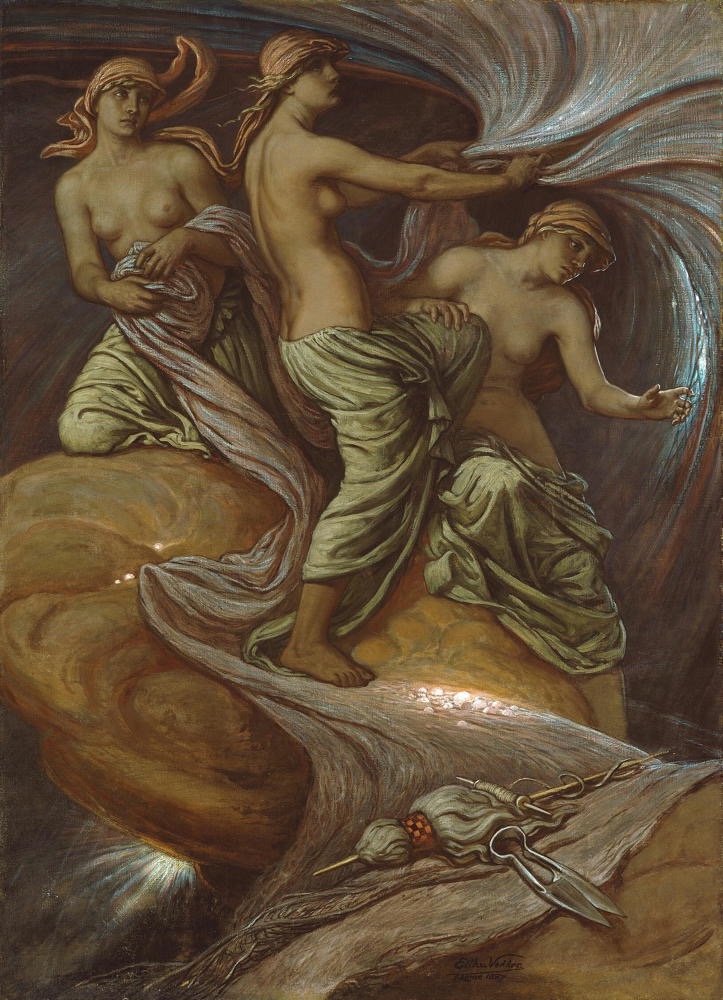The American Dream

Elihu Vedder: The Fates Gathering in the Stars (1887)
Gallery Notes:
Elihu Vedder depicted the three Fates of Greek mythology working the thread of life: Clotho spins the thread, Lachesis fixes its length, and Atropos cuts it at the appointed time of death. Their symbolic tools—spindle, distaff, and shears—rest in the foreground, emphasizing the Fates’ decisive role in matters of life and death. Vedder adapted this painting from an illustration he had designed for an 1884 publication by Edward FitzGerald—a translation of the work of 11th-century poet Omar Khayyám, The Rubáiyát. Vedder was attracted to mysterious, visionary subject matter. Here, he explored metaphysical questions of life, death, and afterlife, subjects at the core of Khayyám’s poetry.
"We will never feel completely satisfied with this perfection."
People have been trying to improve our Constitution since the day it was ratified. It was born broken, the product of debate and compromise, not even aspiring to perfection. It was genius, though, in perhaps only one aspect. It was deliberately drafted to be amendable. It was created to be changed. Change, therefore, would not be evidence of something having been broken. Change would help realize aspiration, which might have been the whole purpose of our Constitution in the first place. It was an aspirational document rather than the final word. A beginning, never the end. It might have been that the Founders envisioned an ending to their story. If so, history has so far foiled that intention. Between those firmly believing that our Constitution is the word of God and those who perhaps equally firmly believe it was the product of typically imperfect people lies the playing field upon which we create our history's first drafts. Our future might draw a few conclusions about it, but we certainly can't.
The resulting government mirrors the Constitution in one crucial aspect. It, too, remains imperfect. It's not that amenable to being judged by satisfaction surveys or other modern marketing mechanisms. It was not intended to be a crowd pleaser, but the mechanism within which we citizens might pursue our pleasure without guaranteeing that anybody would necessarily achieve theirs. It was not supposed to be a guarantee but an enabler. Most of the most challenging parts get left up to the individual. It does not and should not necessarily prescribe except in matters of public safety. Of course, not everybody agrees on what constitutes a public safety hazard. The founders intended such disagreements to fuel lively debates and yield difficult choices. The co-equal branches of the government were designed to keep the playing field at a more-or-less level and the players reasonably intact, as they argued.
They were not supposed to be in the business of picking winners. Winning itself might merely conclude a round, for our Constitution delineated an infinite game that, properly engaged in, might never end. There could be no solving of the underlying Constitutional Problem because this Constitution, by design, could not be solved. It might, however, always be improved, at least from somebody's perspective. That's the underlying difficulty, the essential ongoing dilemma. Fixing the damned thing for one constituent breaks it for another. No free lunch was implied, and no complimentary breakfast, either. In give-and-take engagements, somebody's always likely to get their pocket picked. It might be the purpose of our government to ensure that the same party doesn't always pick everybody else's pocket.
The urge to fix the Constitution runs strong. It's a long-standing intention of every wanna-be nation in the world. Those whose Constitutions remain other than aspirational could never shed their iron fists or lead convictions. They could not quite accept the fundamental fictions essential to constitute any organization of, by, and for the people. The rabble remain in charge of a government populated by bums rather than geniuses. Instead of our few perfections, our flaws define our ultimate capabilities. Our founders finally had to come to grips with the fact that they would never be the crown of anybody's creation, even though, in their time, they might have seemed as though they had achieved that lofty position. They, like us, were a fading influence. Their successes would evolve into their granddaughter's failures, for this had always been the way of this world, and our Constitution, as well as being of, by, and for the people, would have to also be of, by, and for this world as it is rather than as it might be or isn't. A monarch's greatest vulnerability always lies further down the line, when nobody who was there then would be left to remember or enforce the details.
Our founders probably stumbled into creating an evolving framework. Remember, nobody then had ever heard of or imagined evolution. They still believed in divinely inspired creation stories. Evolution, though, necessarily works slowly. It tries our collective patience because many of us would prefer changes to have come yesterday or the day before rather than out into an undefinable future. Evolution teaches, though, the absolute necessity of momentum. Motion might eventually morph into something better. Sitting still ensures nothing. Going backward never recovers any fondly-remembered past because any motion occurs in a sort of absolute sense, neither positive nor negative but forward. The list of geniuses who volunteered to fix our Constitutional system must be much longer than anyone can imagine. That every one of them failed might provide us all reassurance that we might still be on track to retain this damned unfixable thing intact. It has resulted in the most remarkably interwoven tapestry by not really ever trying to please everybody. Still, almost everybody finds some support for their pursuit of better. We will never feel completely satisfied with this perfection.
©2025 by David A. Schmaltz - all rights reserved


